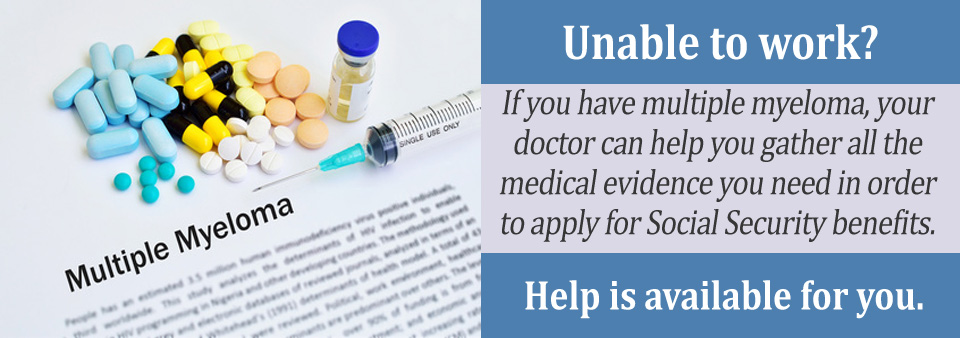If you have been denied Social Security with multiple myeloma, the door has not shut on you when it comes to receiving financial assistance. The Social Security Administration (SSA) has put into place an appeals process that gives American workers a second chance to make a good first impression.
The difference between filing an initial claim and an appeal for denied disability benefits often comes down to submitting more medical evidence that multiple myeloma has racked up considerable medical expenses, while taking away your ability to work at your current job.
Filing a Persuasive Appeal
When you submitted the initial claim for multiple myeloma, you might have noticed the disease is listed in the Blue Book published by the SSA.
The Blue Book lists every medical condition that qualifies Social Security disability applicants for compensation that pays for medical expenses and the wages lost because of missed time from work. Multiple myeloma lists under Section 13.07 of the SSA Blue Book.
It is not enough to have the disease listed in the Blue Book. You also have to suffer from severe symptoms of the medical condition, which include nausea and constipation.
Loss of appetite is often associated with multiple myeloma, which can cause symptoms such as confusion and chronic fatigue. Intense bone pain, especially in the chest or spine, represents the most serious symptom of multiple myeloma that can make you eligible for Social Security disability benefits.
Submit Convincing Medical Evidence
Proving that the symptoms of multiple myeloma have forced you off the job requires the submission of persuasive medical evidence. You might have sent the SSA medical records when you filed the original claim. To appeal a multiple myeloma disability claim, you have to submit more medical evidence that the medical condition has put you out of work.
Diagnostic tests run by your physician start with blood tests that analyze the proteins produced by your myeloma cells. Insufficient production of proteins can give your doctor insight into the severity of your multiple myeloma symptoms.
Urine tests also do a good job of detecting the protein markers that develop from your myeloma cells. An examination of your bone marrow can identify gene variations that can adversely disrupt the production of myeloma cell proteins.

Reverse a Multiple Myeloma Denied Disability Claim with an RFC
A Residual Functional Capacity (RFC) assessment represents a series of tests that measure your physical and mental capabilities while at work. Since multiple myeloma can cause chronic fatigue, an RFC assessment that includes stamina exercises can give a medical examiner from the SSA an idea about your ability to work long shifts.
You might also undergo tests that measure the level of pain in your bones, with an emphasis on detecting intense pain up and down the spine. The SSA conducts RFC assessments to match the unique job descriptions of every applicant that had a denied with multiple myeloma claim.
Speak with a Social Security Attorney
When you received the claim denial letter from the SSA, the clock began to tick on filing an appeal for Social Security disability benefits. The SSA gives all applicants 60 days to submit an appeal, which means you have a short amount of time to make a compelling case the second time around.
Working with a Social Security lawyer can help you make a more convincing case with your appeal for financial assistance. Your attorney can help you organize more influential evidence in the form of medical records and the result of an RFC assessment.